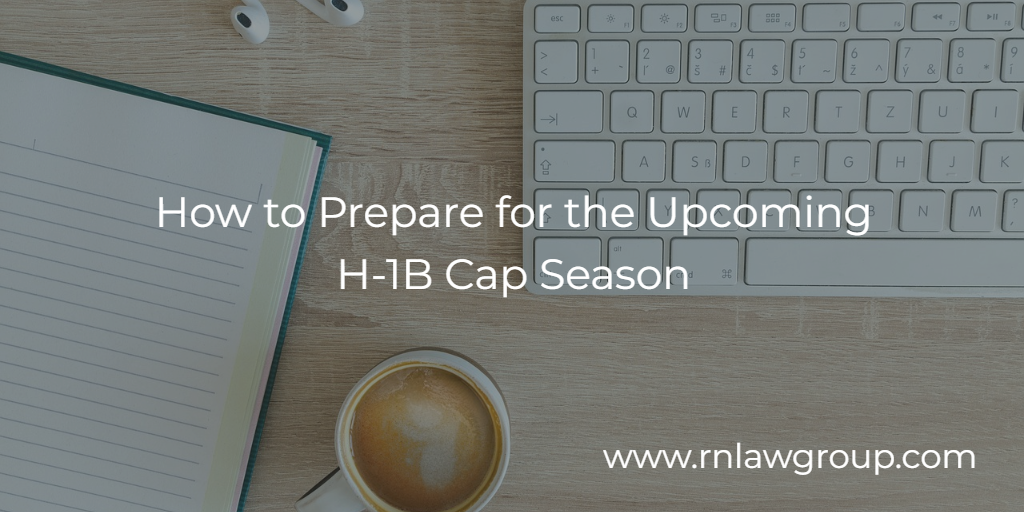
How to Prepare for the Upcoming H-1B Cap Season
Once again, USCIS is conducting the electronic registration process for the upcoming H-1B lottery. USCIS has not yet announced when the electronic registration will open, but most likely it will open early March and be open for a 3-week period. All those seeking to file an H-1B cap subject petition, whether in bachelor’s cap or master’s cap, will have to pay the $10 H-1B registration fee per registration. The registration process will require basic information from each Petitioner about their company and the requested H-1B worker. USCIS has provided step-by-step instructions for Petitioners to register using an online account. A Petitioner or its authorized representative must electronically submit a separate registration request naming each individual it seeks to petition for a cap-subject H–1B.
Once the random selection process, or lottery, has been run on the submitted electronic registrations, electronic notices will be sent to all registrants that were selected. These notices will inform the employer they are eligible to file an H-1B cap-subject petition on behalf of the individual named in the notice, within the filing period indicated on the notice, which is usually between April 1st and June 30th. The account holder who submitted the selected registration will receive notification via email or text message stating that an action has been added to their account, and they will have to log in to see the full notice.
So how can you as an employer start getting ready for the upcoming H-1B cap season?
- Make sure you have an H-1B Registrant account with USCIS.
If you have submitted electronic registrations in the past, you can use the same account for this H-1B lottery again. However, if this is your first time to submit electronic registration for the H-1B cap, you must use a “registrant” account within myUSCIS to submit registrations. USCIS will announce when employers can begin to create H-1B Registrant accounts.
- Begin gathering registration details for your candidates.
When submitting registrations, you will need to enter the following details for each candidate:
- First name, middle name, last name
- Gender
- Date of birth
- Country of birth
- Country of citizenship
- Passport number
- Identify whether you are requesting consideration for Master’s cap
Having these details organized and checked beforehand will help the registration process go smoother for the company and/or the attorney submitting the registrations.
- Ensure your candidate is qualified for an H-1B specialty occupation position.
One of the requirements that must be satisfied in order to receive H-1B visa status is that the H-1B worker must be qualified for the H-1B specialty occupation.
The primary way to demonstrate an H-1B worker is indeed qualified for the position is to show that the H-1B worker has a U.S. bachelor’s degree or higher in a field that is relevant to the specialty occupation. For example, a person with a U.S. bachelor’s degree in Computer Science or Software Engineering would likely be qualified for a Software Developer position. People with foreign degrees that are related to the specialty occupation may also be qualified for H-1B specialty occupation as long as they are able to demonstrate that their foreign degrees are the equivalent to a U.S. bachelor’s or higher degree. There are a number of education credentialing services that provide such evaluations.
Determining whether an H-1B worker is qualified for an H-1B specialty occupation and devising a strategy to prove such qualifications is vital to the success of any H-1B petition and should be done early on in the H-1B process. Failure to do so can lead to unanticipated RFEs or NOIDS, and even the denial of the H-1B petition.
- If you are registering your candidate in the Master’s cap, make sure the candidate is eligible for the Master’s cap.
In order to qualify for the advance degree exemption, or the Master’s cap, the beneficiary must have earned, at the time of filing, a Master’s or higher degree from a qualifying U.S. institution of higher education as defined in 20 USC 1001(a).[1] By regulation, the U.S. degree must be issued by an institution of higher education that is a public or other nonprofit institution and accredited by a nationally recognized accrediting agency or granted a pre-accreditation status. In respect to the institution’s accreditation requirement, the school must have been accredited, or in pre-accreditation status, at the time the degree was conferred. This distinction is important to mention because if the otherwise qualifying school was properly accredited at the time a student graduated (degree was conferred), but then later that school lost accreditation, the loss of accreditation would not impact that student’s eligibility for the Master’s cap.
Below are some common scenarios with the Master’s degree and determining eligibility for the Master’s cap exemption:
- Master’s from a private, non-profit, accredited school? Eligible.
• Master’s from a private, for-profit, accredited school? Not eligible.
• Master’s from a public, non-profit, unaccredited school? Not eligible.
• Master’s from a private, non-profit, unaccredited school? Not eligible.
As H-1B cap season is quickly approaching, now is the time to prepare and gather details about your candidates and making sure they qualify for an H-1B visa. Reddy Neumann Brown PC will continue to provide updates as additional information is received by USCIS about this year’s upcoming H-1B cap season.
